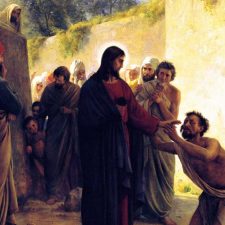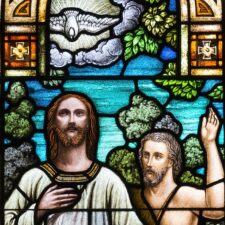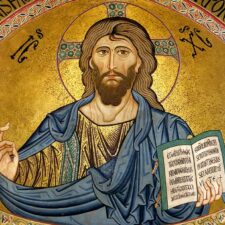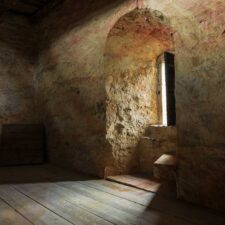Alas, sinful nation, people weighed down with iniquity, offspring of evildoers, sons who act corruptly! They have abandoned the Lord, they have despised the Holy One of Israel, they have turned away from Him. Where will you be stricken again as you continue in your rebellion? The whole head is sick, and the whole heart is faint. From the sole of the foot, even to the head, there is nothing sound in it, only bruises, welts, and raw wounds, not pressed out or bandaged nor softened with oil. Your land is desolate; your cities are burned with fire; your fields— strangers are devouring them in your presence; it is desolation, as overthrown by strangers. (Isaiah 1:4-7)
Isaiah begins his writing with a complete indictment of His covenant nation for their consistent breaching of the Mosaic Covenant and yet God offered His complete forgiveness to those who would repent but judgment to those who continued to rebel. The Lord is prophesying to His people about their current condition and fate. This condition is an illustration of the effect of sin on any nation, even God’s people. The Law of Moses was introduced to provide a foundation for His nation to find God’s perfect justice, leading to His righteousness.
The ultimate conclusion is found in verses 18-20,
“Come now, and let us reason together,” says the Lord, “Though your sins are as scarlet, they will be as white as snow; though they are red like crimson, they will be like wool. “If you consent and obey, you will eat the best of the land; But if you refuse and rebel, you will be devoured by the sword.”
Truly, the mouth of the Lord has spoken. The Lord is pointing to the coming Messiah and the victory over sin that is the believer’s when he is willing to walk with his God in obedience. Needless to say, Israel remained rebellious and paid the price.
The Law of Nature
The Apostle Paul defines for us in Romans 5:13 that before the Law, although sin was present in the world, sin is not imputed to each man. Instead, as Romans 2:14-15 illuminates,
for when Gentiles, who do not have the law, by nature, do the things in the law, these, although not having the law, are a law to themselves, who show the work of the law written in their hearts, their conscience also bearing witness, and between themselves, their thoughts accusing or else excusing them).
Romans 1:20 confirms that the Lord’s invisible attributes are clearly seen, being understood by the things that are made, even His eternal power and Godhead, so that they are without excuse. Creation testifies to the law of nature, which reveals the righteousness of God to any man who wishes to live according to that righteousness.
Isaiah 30:15 tells us that man’s solution is repentance and rest: For thus the Lord God, the Holy One of Israel, has said, “In repentance and rest you will be saved, in quietness and trust [confidence] is your strength.” But you were not willing. Israel failed to submit to the righteousness of God (Romans 10:3).
The Work of Righteousness
Until the Spirit is poured out upon us from on high, and the wilderness becomes a fertile field, and the fertile field is considered as a forest. Then justice will dwell in the wilderness, and righteousness will abide in the fertile field. And the work of righteousness will be peace, and the service of righteousness, quietness, and confidence forever. Then my people will live in a peaceful habitation, and in secure dwellings, and in undisturbed resting places. (Isaiah 32:15-18)
The Lord’s solution to Isaiah’s condition is delivered to Isaiah in Isaiah 32. The chapter starts in verse 1 with a reference to a king who would reign righteously and princes justly. He is speaking of the coming Messiah who would rule the earth for 1,000 years under a new covenant. He was also referring to a time when the Holy Spirit is poured out, and everything is changed. Israel’s deserts will be fertile, and with justice and righteousness will come peace and quietness and security for the redeemed. This peace will not be the result of man’s efforts but the work of righteousness itself and found resident in the new covenant. Then my people will live in a peaceful habitation, and in secure dwellings, and in undisturbed resting places. A new relationship with God can produce a righteous life and a peaceful habitation.
Living in Righteousness
This new covenant, as promised to Israel in Jeremiah 31:31-34, is also given to the church in Hebrews 8:10-12 with Jesus, the Messiah as its mediator. Peter understood the importance of Jesus within this new covenant when he said, And He Himself bore our sins in His body on the cross, so that we might die to sin and live to righteousness; for by His wounds, you were healed. For you were continually straying like sheep, but now you have returned to the Shepherd and Guardian of your souls (1 Peter 2:24-25). The possibility that a man can live in righteousness is the direct consequence of Jesus’s sacrificial death, so the believer might die to sin. Finding the Shepherd and Guardian of the soul means he has the divine guidance and encouragement necessary to be victorious despite a corrupt world.
Everyone who practices [present active participle – simultaneous occurrence] sin also practices lawlessness [anomia – violation of the law], and sin is lawlessness. You know that He appeared to take away sins, and in Him, there is no sin. No one who abides [meno – remain, continue, stand firm, endure] in Him sins; no one who sins has seen Him or knows Him. Little children, make sure no one deceives you; the one who practices righteousness is righteous, just as He is righteous; the one who practices sin is of the devil; for the devil has sinned from the beginning. The Son of God appeared for this purpose, to destroy the works of the devil. No one who is born of God practices sin because His seed abides in him, and he cannot sin because he is born of God. (1 John 3:4-9)
The New Testament writers have helped to define this principle of sin in practical ways so that we might comprehend its powers. John writes in the above passage that sin is lawlessness (any violation of the law). It is a rejection of God’s standards as revealed to each believer through His Word. In 1 John 5:17, All unrighteousness is sin, and there is a sin not leading to death. Not only is sin lawlessness, but it is the opposite of righteousness. By making the statement, in Him there is no sin, John lays the foundation for his conclusion that the one who abides in Christ cannot sin. Practicing sin (continuing to repeat the same action) keeps man from seeing or knowing God experientially. On the other hand, the one who abides in Christ abides with the righteous One and is empowered to practice righteousness. So, what does it mean to abide in Him?
Abide in Me
Abide in Me, and I in you. As the branch cannot bear fruit of itself unless it abides in the vine, so neither can you unless you abide in Me. I am the vine; you are the branches; he who abides in Me and I in him, he bears much fruit, for apart from Me, you can do nothing. If anyone does not abide in Me, he is thrown away as a branch and dries up; and they gather them and cast them into the fire, and they are burned. If you abide in Me, and My words abide in you, ask whatever you wish, and it will be done for you. My Father is glorified by this, that you bear much fruit, and so prove to be My disciples. Just as the Father has loved Me, I have also loved you; abide in My love. If you keep My commandments, you will abide in My love, just as I have kept My Father’s commandments and abide in His love. (John 15:4-10)
The Greek word for “abide” is meno, and its basic meaning is to remain, to continue, to stand firm, or to endure. The Theological Dictionary of the New Testament (Kittels) gives us the following explanation:
In the New Testament, the word “meno” is an important one relative to the permanence of God in contrast to human and earthly mutability. As the Old Testament says, God is the eternal God whose counsel and word abide forever (Isa 7:7; 14:24; 40:8), whose eternal city will also remain in the new heaven and earth (Zech 14:10; Isa 66:22), and who gives the righteous a share in his enduring (cf. Ps 112:3 Ps 112:9). The New Testament repeats these points. God’s counsel endures (Rom 9:11), his word endures (1 Peter 1:23,25), the new covenant endures (2 Cor 3:11), and faith, hope, and love endure (1 Cor 13:13). In John 12:34, Christ himself remains forever, and in 1:32 the Spirit does not just visit him but remains on him. In the Johannine writings, this becomes a more personal abiding in Christ or in God as the converse of God’s abiding in Christ or Christ in them (cf. John 6:56; 15:4 ff.; 14:10; 1 John 2:6,24,27). In this abiding, eschatological promise is already possession, but the concept of abiding rules out mystical or ecstatic identity.
As Jesus explains in John 15, the one who abides in Him is the one who bears fruit, more fruit, and much fruit. It is a principle that ties each believer to the permanence of God through faith, hope, and love, and the new covenant. As Jesus Christ has proven His commitment to each believer in the Body of Christ through the cross and the abiding Holy Spirit, the believer has an anchor for the soul, a hope both sure and steadfast and one which enters within the veil, where Jesus has entered as a forerunner for us, having become a high priest forever according to the order of Melchizedek (Hebrews 6:19-20). In John 15:4, Jesus challenges the believer to Abide in Me as the cause, with the effect being that He will abide in us. The strength of the relationship and the resulting fruit are the by-products of the vine’s ability to deliver on its promises and not the believer’s work; for apart from Me, you can do nothing. Just as he learns to put complete trust in the Word of God, the believer discovers that the love between the Father and the Son is the same as the love he receives from His Lord. And the certainty that Jesus will abide in the Father’s love and keep His commandments is the same certainty that the believer can keep the Lord’s commandments.
Put on the New Self
that, in reference to your former manner of life, you lay aside the old self, which is being corrupted in accordance with the lusts of deceit, and that you be renewed in the spirit of your mind and put on the new self, which in the likeness of God has been created in righteousness and holiness of the truth. (Ephesians 4:22-24)
The challenge that each believer faces relates to the remaining power and working of the flesh, the sinful and unregenerate self, before salvation. Paul tells us to lay aside that life (completed action) for the brand-new life through the renewal of the spirit of the mind, an ongoing work of the Holy Spirit as Galatians 5:16 documents: But I say, walk by the Spirit, and you will not carry out the desire of the flesh. This new life is characterized by both righteousness (character of life) and holiness [hosiotes – related to the keeping of ordinances]. This holiness is a by-product of an intimate fellowship with God and a commitment to the truth.
Highway of Holiness
A highway will be there, a roadway, and it will be called the Highway of Holiness. The unclean will not travel on it, but it will be for him who walks that way, and fools will not wander on it. No lion will be there, nor will any vicious beast go up on it; these will not be found there. But the redeemed will walk there, and the ransomed of the Lord will return and come with joyful shouting to Zion, with everlasting joy upon their heads. They will find gladness and joy, and sorrow and sighing will flee away. (Isaiah 35:8-10)
The Jewish relationship with the Messiah in the Kingdom Age is illustrated as a Highway of Holiness. No unclean person or fool will desire to walk on it; no lion or other vicious enemy will be found there. This highway takes each believer into intimacy with God in joyful shouting, as represented by Zion. This new covenant relationship with Jesus as Messiah is characterized by gladness and joy without evidence of sorrow. Abiding in Him is the strength of this highway accomplished by Jesus on the cross 2,000 years ago and available to anyone who chooses to believe in Him.













